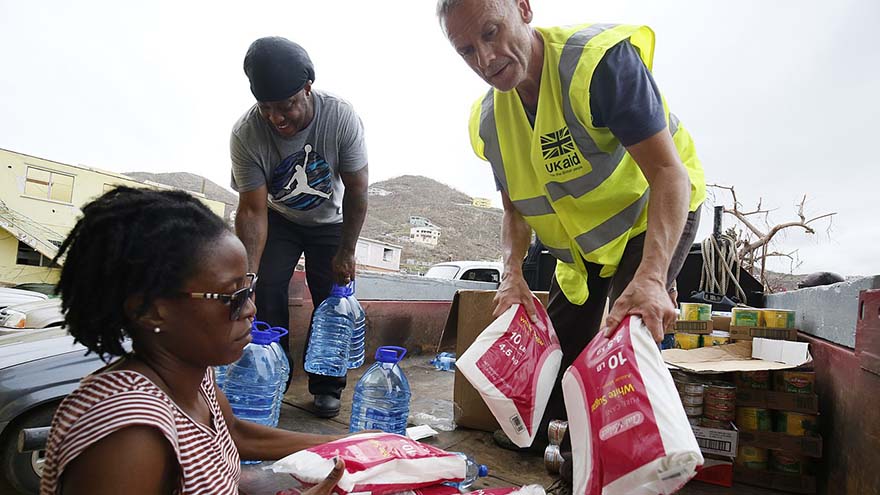We need a new way to think about aid

The West’s idea of international aid and development as the rich world rightly meeting its ethical obligation to help poor countries to modernise and join the club of developed countries is looking increasingly out of touch with the times.
For a start, most aid today is going to people in the rich world. The hundreds of billions of dollars distributed as COVID-19 aid in Europe and the US dwarfs the $152.8bn that OECD countries gave as international aid in 2019. The UK government alone has already paid more than £250bn in aid to its own people in 2020 in salary and small business grants and increased health spending. We are all aid beneficiaries now.
Then there is the paternalistic and neo-colonial character of “foreign aid”, which is increasingly resented, in Africa especially, because it sustains racist tropes and ingrained practices of white hegemony. The call is growing to “decolonize aid” and have international aid given directly to national governments or local organisations in a way that ends the white rule of UN agencies and international NGOs. More radical campaigners want aid redefined as “reparations” for centuries of slavery and colonialism.
Conservative nationalists are anti-aid and development because they deem it absurd and wasteful in deeply corrupt states. They also reject the anti-capitalist virtue signalling of do-gooding UN and NGO elites. Hardcore conservatives would spend development funds on domestic priorities or limit it tightly to a foreign policy agenda linked firmly to national interest and emergency aid. Hence the UK government’s merger of DFID and the FCO.
Then there is the new geopolitical context of western aid. What’s the use of OECD states trying to be nice with $150bn of carefully administered international development aid that replicates western safety nets for the world’s poor when a new model of hard power aid is in play. Democratic governments can clearly see that their soft power aid has to get smarter if they are to compete with new models of authoritarian aid.
China has largely rejected the western aid system driven by the OECD and the UN. Exceptions are China’s strategic interests in global health and food security via WHO and FAO, and its big play in UN peacekeeping where China is the top provider of troops and finances combined. Peacekeeping is good field experience for the People’s Liberation Army and shows commitment to China’s long policy of rejecting direct military action as a solution to civil wars in contrast to its four fellow permanent members of the UN Security Council.
Instead, Chinese aid policy means business. If Western aid prioritises investments in health, education and governance, China pursues commercial investment via its Belt and Road Initiative (BRI) which may well invest over $1 trillion in infrastructure-first trade support to 70 countries by 2027. Chinese aid is framed as solidarity-based “south-south cooperation” between States previously colonised by Western powers so they can apply the miraculous “Chinese model” of development to grow wealthy and strong beyond a Western grip.
Russia and Turkey are also pursuing their versions of hard power aid. Russia is back in Africa as a military advisor and arms trader. Turkey has prioritised new diplomatic and commercial investments across Africa with 42 new Embassies and 54 new airline routes since 2005, and humanitarian aid in Somalia because the Horn of Africa is potentially such a massive trading partner to West Asia.
Where does all this leave the western model of international aid and development? We need a new model of helping others and ourselves which is more fitting for today’s world.
First, COVID-19 helps us see that we all need aid sometimes. It is not just something a rich world kindly gives to a poor world but is vital for us all to sustain public goods and personal wellbeing in a world which none of us controls. So, let’s get over being anti-aid and accept aid as a necessary good.
Second, let’s get rid of the idea of development and its patronising model of tutoring under-performing nations into a correct form of Western modernity. Instead, we should focus international policy on the bigger frame of global justice and everything that makes a fairer world. Here, Western commitments to health, education, gender equality, trade and climate action are a smart focus.
Third, if our aim is global justice then international policy must focus more on things States should stop doing. Providing aid is a positive duty but all States have more important negative duties to stop doing things that harm global justice like global warming, skewed trade, racism, misogyny, violence and corruption.
Finally, the goal of global justice makes every people and their government responsible for a fairer world and breaks aid’s dangerous idea that there are givers (who are responsible) and receivers (who are not). Structural injustices and poverty arise from reasons in the present as well as the past. The legacies of colonialism and white supremacism are wicked and deep but they are not the sole sources of poverty, environmental damage and suffering today. The wickedness of kleptocracy, negligence and the violence of supremacist ideologies in dictatorial governments, economic elites and armed groups also cause terrible damage to people’s life chances in many parts of the world.
This is a good moment to stop talking in worn out tropes of aid and development from rich to poor. Instead, the UK government’s Integrated Review could frame UK policy and ambition as the responsibility of every government and every citizen for global justice – a justice that is social, economic, political and ecological.
Hugo Slim is a Senior Research Fellow at the Institute of Ethics, Law and Armed Conflict (ELAC) at the Blavatnik School of Government.
Image caption: Food supplied by UK aid for people affected by Hurricane Irma is distributed in East End, Tortola, BVI. Photo: Russell Watkins/DFID
